15-year Anniversary of ICAP
In 2022, the International Carbon Action Partnership celebrated its 15th birthday.
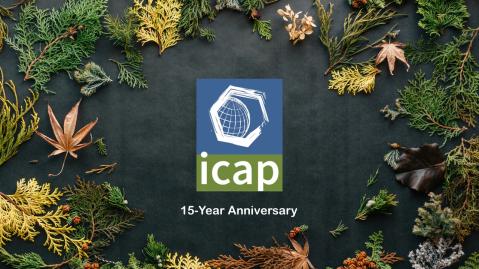
Greetings from the ICAP Co-Chairs
The International Carbon Action Partnership has turned 15 years! The jurisdictions we represent – Germany and California – helped to initiate ICAP and have been members since the beginning. We are honored to serve as Co-Chairs to such an outstanding coalition, building on the leadership of all the inspiring individuals who held this role before us.
It is remarkable to think back to 2007 when ICAP was founded. At the time, California was evaluating options to achieve its 2020 greenhouse gas emissions target, and Europe had just launched the world’s first ever emissions trading system (ETS). As California and the EU have developed and refined their systems over time, ICAP has been an important venue for connecting and sharing information with other jurisdictions that have implemented or are developing their own programs.
Since 2007, we have also seen ETS proliferate across the globe – from just a handful to almost 50 under consideration, in development, or in operation today. We know that ICAP has been just as valuable a resource for these jurisdictions as it has been for us. ICAP has consistently tracked the status and design of these systems, offered insightful, timely research into the most pressing ETS policy and implementation questions, provided capacity-building and assistance to jurisdictions developing new ETSs, and created a platform for governments to share experiences. Through ICAP, jurisdictions have learned from one another how to design, implement, and update critical climate programs - learning through dialogue and best practices from those who preceded us, as opposed to relying on trial-and-error.
ICAP membership has significantly expanded over time, growing from the 19 original signatories of the ICAP political declaration in 2007 to the current group of 33 members and 7 observers. With governments often stretched thin, no single jurisdiction has the capacity to offer the invaluable services that ICAP does.
The work is far from over. In California, we just approved our 2022 Scoping Plan that charts our state’s unprecedented path towards carbon neutrality by 2045 or sooner. In Europe, we are close to concluding the ‘Fit for 55’ reform process that will redesign the EU ETS for the next decade and beyond. Similar reform processes are also underway in many other jurisdictions. At the same time, ever more systems are in the pipeline. Reaching ambitious net-zero targets and meeting the global challenge of keeping warming to 1.5 degrees or less will require innovation and partnerships at the global level, especially on an instrument as effective as ETS. We know ICAP will continue to be an indispensable convener and ally in this critical work. We look forward to continue engaging with all ICAP members and observers along this journey.
RAJINDER SAHOTA
Co-chair of the International Carbon Action Partnership and Deputy Executive Officer Climate Change and Research, California Air Resources Board
DIRK WEINREICH
Co-chair of the International Carbon Action Partnership and Head of Division 'Climate Legislation, Emissions Trading, Federal Ministry for Economic Affairs and Climate Action Germany
Reflections from the ICAP Secretariat
In the beginning...
The idea behind the International Carbon Action Partnership (ICAP) was born in 2007, in the policy planning department of the German Foreign Office, with a view to begin fostering cooperation on international climate change issues and related foreign policy. From humble beginnings in a single email inbox, a political declaration was signed in Lisbon in the same year.
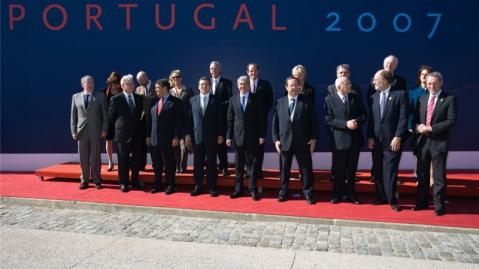
Founding Cermony of ICAP in Lisbon, Portugal (29 October 2007)
ICAP quickly began to garner attention and grow. It welcomed its first memberships from governments around the world thinking about and working on emissions trading systems (ETS). The Secretariat moved soon after to the German Federal Ministry of the Environment.
It took several forays into new territory for ICAP to find its niche in the world of carbon pricing, and climate and foreign policy more broadly. ICAP’s first steps were taken in the Kyoto era – where linking seemed a conceivable way to build a global carbon market “under the Kyoto cap” and where an organization like ICAP could facilitate and accelerate this effort. For this reason, ICAP began with a focus on any and every technical aspect of ETS, in particular the design elements that might facilitate future linkages, such as MRV, allocation, scope, and coverage.
In this period 2007-2013, the Secretariat was led by Martin Bergfelder, later succeeded by Tobias Hausotter. ICAP engaged early on with jurisdictions in the Asia-Pacific region – notably from South Korea, Australia, New Zealand, Kazakhstan, and national and subnational systems in Japan. Dialogue with these regional frontrunners at the time was an important signal of true international cooperation and laid the foundations for the diverse set of members and observers that make up ICAP today.
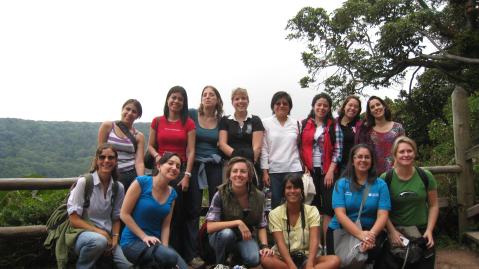
ICAP ETS Academy in Costa Rica (2012)
Capacity-building and outreach on the fundamental ETS features became a core workstream for ICAP. The first ETS Summer Academy also took place then – an initiative that continues to this day. It is now one of ICAP’s most coveted capacity building courses and over time has helped foster a global community of ETS practitioners: the ICAP alumni. Activities with China, too, commenced: a conference in 2009, two workshops in 2011 on emissions data management and monitoring in the power sector, and several special editions of the ICAP Summer Academy. After 2011, technical dialogue and knowledge-sharing beyond ICAP’s membership became increasingly important. An initial version of ICAP’s ETS Map that visualizes up-to-date information on global ETSs was launched in 2012, and a first knowledge product on carbon market oversight was published in 2013, both providing an important basis to later expand ICAP’s role as an ETS knowledge hub.
An era of growth...
In 2013-2020, ICAP – along with the number of ETSs worldwide – grew and changed significantly, under the careful leadership of Constanze Haug and later William Acworth. More systems sprang up around the world and existing systems leapt forward, implementing reforms, and deepening their markets. Discussions and exchange on the technical elements of ETS became much more tangible, as theory turned to practice, and systems went from design to implementation. ICAP’s technical dialogue workstream thus grew in prominence.
At the same time, there arose an appetite for ETS in emerging economies. This brought with it new questions, such as how an ETS might work in jurisdictions with a regulated power sector. The realization of the practical challenges of ETS linking, with system designs strongly rooted in domestic economy considerations, also meant that previous hopes of transatlantic linking and the construction of a single, global carbon market became less feasible.
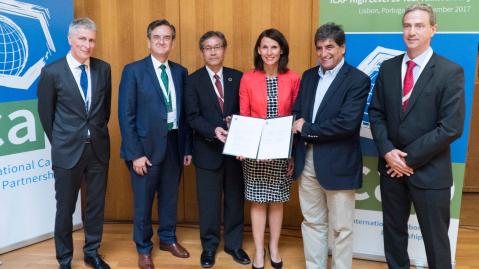
10-year anniversary of ICAP in Lisbon, Portugal (2017)
But global cooperation and exchange remained all the more relevant in a world where models of ETS implementation – with view to scope, allocation, and cap-setting – varied significantly from continent to continent. Renewed vigor in ETS’s potential as a key instrument to tackle climate change meant that those in the field relished the opportunity to learn from their peers. ICAP’s capacity-building programs and training courses also began to reflect the accumulation of practical experiences. With the introduction of ETS master classes, ICAP responded to the growing need not just for conveying ETS basics, but for opening a channel for seasoned ETS practitioners to convey their knowledge to a new generation of ETS designers, working to launch systems in the Global South. The ICAP alumni from these training courses now comprise around 1000 practitioners keeping in touch, working together, and exchanging when they meet at international climate events.
ICAP’s role as an ETS knowledge hub also began to evolve in this time. In 2014, the first edition of the annual Emissions Trading Worldwide Status Report was published. This has become a critical ETS resource and our flagship publication. In 2015, together with the World Bank’s Partnership for Market Readiness, ICAP brought together practical lessons on ETS design and implementation in an ETS Handbook, sparked by demand from policymakers around the world. We expanded our ETS news reporting, and in 2019 launched our Allowance Price Explorer.
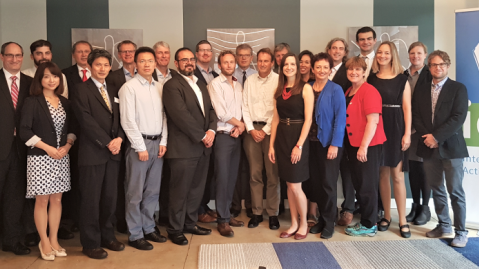
ICAP Annual Meeting 2018 in New York City
Even as other global initiatives emerged, focusing on different aspects of carbon pricing, ICAP retained its position as a key institution with authority to speak on ETS. To this day, ICAP remains a safe and neutral forum to openly exchange on ETS design and engage in advanced technical dialogue. ICAP continues to forge collaborations with other carbon pricing initiatives around the world.
The view from here to the future...
Stefano De Clara has been at the helm since 2021. Now, 15 years since ICAP’s inception, we find ourselves once again at a crossroads with ETS. Established systems from the last decade are maturing. They are largely stable, reliable, and have weathered various storms, showing resilience to financial crises, a pandemic, and now a global energy crisis. At the same time, new systems are also coming online, especially in the Latin American and Asia-Pacific regions.
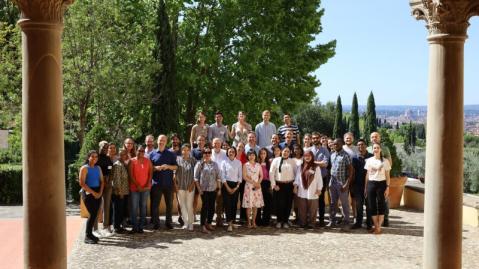
ICAP ETS Academy in Florence, Italy (September 2022)
The objectives of policymakers have shifted towards aligning these policy instruments with long-term, ambitious climate targets. We look towards the future and ask such questions as: how will ETS work in a net zero scenario? And what role might removals play?
The EU’s proposal for a carbon border adjustment mechanism also provides a sharp impetus for ETS and other carbon pricing instruments, which have become more diverse. Among the jurisdictions currently considering an ETS, very few are designing ‘traditional’ cap-and-trade like the first wave of systems, such as the EU, California, Quebec, New Zealand, South Korea, and others. The next generation of ETS, predominantly designed and implemented in developing countries, will feature alternative design elements, such as intensity-based caps, or will be a hybrid of various mechanisms. These systems will need to be carefully crafted to become tried and trusted climate policy tools that can help jurisdictions meet objectives in their own unique situations. The world is increasingly complex, and ETS is flexible enough to meet this complexity. Looking ahead, ICAP will continue to delve into these dynamic topics, to affirm the role of ETS in achieving net zero emissions.
The ICAP Secretariat is relentless in its mission to help governments across the globe engage with each other and create strong emissions trading systems that can spur us along the road to climate neutrality. Thank you all for your support over the years. We look forward to the next 15.
All the very best, from the Heads of the ICAP Secretariat, past and present.
Stefano De Clara (2021-present)
William Acworth (2020-2021)
Constanze Haug (2013-2020)
Tobias Hausotter (2010-2013)
Martin Bergfelder (2007-2010)
Reflections from ICAP members
Now for some kind words from a few longstanding members…
European Union (Beatriz Yordi)
Having been with ICAP since its inception, it is great to celebrate our 15th anniversary together. Carbon pricing has developed notably in this time, with the EU Emissions Trading System becoming a cornerstone of EU climate policy. ICAP has followed this evolution closely. With an engaged and growing community of members as well as driven policy research coming from the Secretariat, ICAP continues to support a dialogue on carbon pricing that is current, technical, and forward-looking. It allows jurisdictions to learn from each other’s experiences and explore practical solutions to common challenges. ICAP also provides a platform for engaging with emerging and developing jurisdictions. It has been particularly rewarding to help the ICAP’s alumni network grow and the policy action on climate change advance. As a former Co-Chair, I would like to congratulate ICAP’s team and wish you all the best for the next 15 years!
Netherlands (Marc Allesie)
Let me start with my congratulations for ICAP’s 15th anniversary. After 15 years still very young and indispensable in the fight against climate change!
It was an honor for me to participate in ICAP. For me, it started at an ICAP annual meeting in Montreal in 2014, where Jean-Yves Benoit and I were chosen as Co-Chairs, a role which I held for more than four and a half years. What a pleasure it was for me to contribute to the growth of the ICAP network, its high-quality knowledge products, and collaboration with other actors in the field of ETS. This is what makes ICAP so very special: worldwide cooperation to bring forward the crucial instrument of emissions trading. Recent reports show once again that climate change is a real and immediate threat, and emissions trading is a key tool in this fight.
I have very fond memories of my ICAP period. It is so good to see that the ICAP family is still growing – I hope this growth will continue. Your work is still very important! I wish the ICAP network a very bright future and all kinds of success on the way to climate neutrality.
New York (Jared Snyder)
I am pleased to have participated in ICAP’s mission to establish and strengthen ETS across a broad spectrum of political jurisdictions. ICAP facilitates progressive climate action by quietly and steadfastly bringing together professional colleagues who inspire one another and help jurisdictions make true progress in the fight against climate change.
Three elements stand out to me: attending the 2007 formation event in Lisbon, where Governor Spitzer committed New York State as a founding member of ICAP; serving as Co-Chair in 2011-2014, which helped me to build positive professional relationships; and participating in ICAP training courses that enable governments with different political structures to set a mandatory emission reduction consistent with each region’s unique economic structure. I saw the power of this model when serving as a trainer for classes held in Istanbul (2013) and the Hague (2013).
ICAP also serves as a valuable forum for sharing best practices among experienced practitioners. I found presentations on energy-intensive trade-exposed industries and the role of benchmarking to be particularly valuable, as New York considers new policy options. I am confident that ICAP will continue to help us all as we strive to reach the climate goals necessary for global health and well-being.
New Zealand
Happy 15th birthday ICAP! Aotearoa New Zealand has long supported and benefited from ICAP’s expertise and international outreach. We particularly welcome the cooperation ICAP has helped facilitate between government and public authorities that have implemented or are planning to implement an ETS. The opportunities ICAP provides to share best practices and have free and frank discussions help us all be better informed about improvements to the ETS and opportunities for international cooperation in carbon pricing. Continued dialogue on carbon markets is important to New Zealand.
The increase in emerging carbon pricing mechanisms is in part due to the outreach and capacity building activities ICAP has led. Its work directly helps jurisdictions develop carbon pricing mechanisms, and by doing so, contributes to global efforts to mitigate emissions and combat climate change. Well-functioning carbon markets are a priority area for us.
On a more personal level, we appreciate the ICAP team’s expertise and friendly communication in our interactions. We also appreciate the efforts to organize discussions in a time-zone that suits New Zealand (or offering us the opportunity to catch up separately if that’s not possible). We look forward to working with ICAP for the next 15 years!
Québec
Québec is proud to be an ICAP member since 2008, the year following its creation, and to have co-chaired 2014-2018. Québec’s cap-and-trade system, launched in 2013 and linked to California’s program a year later, has greatly benefited from the expertise of ICAP and its fellow members through sharing best practices and insights, and ICAP’s highly pertinent publications and diverse technical dialogues. Thanks to its extensive involvement with ICAP, Québec has been able to better design, develop, and implement its system.
By actively participating in ICAP’s numerous initiatives, notably to help build global technical capacity, Québec has made invaluable connections around the world, some of which have led to international cooperation agreements and the development of new carbon pricing schemes. As co-chair of the Carbon Pricing in the Americas collaboration platform and as member of similar forums, Québec has witnessed firsthand ICAP’s positive involvement in other partnerships that support carbon pricing and climate action around the world. ICAP has succeeded in creating a carbon market community like no other.
Over the years, Québec has been pleased to contribute to the organization, notably by financing the 2018 Guide to Linking ETS and the development of a Carbon Pricing Ratio Database. As governments around the world try to find solutions to the global climate emergency, Québec sincerely believes that ICAP’s excellent work is more relevant than ever.
Spain
Spain is one of the founding members of ICAP, which was established in Lisbon. Curiously, the founding political declaration back in October 2007 was signed on behalf of the Spanish government by our current Minister for Ecological Transition and the Demographic Challenge, who is also Vice President in the present government.
In recent years, our world has changed in ways we certainly could not have expected back in 2007. But one issue we were already aware of then is becoming increasingly evident: the need to act decisively against climate change and the prominent role that cap-and-trade should play in a world where price signals are so important. ICAP is unique in that it brings together public officials from around the world who are working on the ground to implement this type of policy instrument.
In the 15 years since ICAP’s founding, its products, technical debates, knowledge-sharing, and outreach activities have increased in quality and quantity. Most importantly, the ICAP community has grown significantly, also through collaborations with other organizations and training events. We are sure this trend will extend to the coming years and that ICAP will continue to fulfil its part in the great challenge of reaching the Paris Agreement targets.
Tokyo Metropolitan Government
Tokyo Metropolitan Government has been a member of ICAP since 2009. ICAP plays an important role in contributing to the establishment of well-functioning carbon markets, so we are very proud of our membership.
In 2010, ICAP’s annual meeting was held in Tokyo and led to many inspiring discussions. Being able to host such a fantastic meeting was very memorable for us. Since then, we have attended many more annual meetings and delivered several presentations about our cap-and-trade program. These have been wonderful opportunities to share our policy and strategy with the world.
Thanks to ICAP, we are able to stay up to date with the latest ETS developments and engage with other countries and cities. In our opinion, one of ICAP’s most incredible activities is the publication of the detailed Status Report every year – we really make use of this report.
Thank you to ICAP for your continued support. We are delighted to continue working together.
United Kingdom
As a founding member of ICAP, the UK can look back on 15 years of valuable collaboration. Over this time, ICAP has successfully raised the profile of carbon pricing as part of the solution to the world’s decarbonisation challenge. Its success is underlined by its ever-growing membership and the proliferation of carbon pricing around the world. Reflecting this important work, this year the UK strengthened its relationship with ICAP by becoming a core funder of the organization.
The UK views ICAP as a vital forum for discussion and practical collaboration on ETS. ICAP’s own research on important areas like climate clubs and the role of carbon pricing in wider decarbonisation policy has provided the UK with expert advice on many technical issues. Recently, we have greatly valued ICAP’s support and guidance as we set up the UK ETS, for example through two days of bilateral engagement for UK Government officials in 2019.
We also value ICAP’s celebration of member achievements through multilateral calls and annual status reports. In August this year, we were delighted to support ICAP’s Summer School in-person. The UK strongly endorses this flagship training course, which this year reached countries across six continents! We were pleased to share the UK ETS’s successes on topics including cap setting, market stability, and carbon leakage.
ICAP’s impressive understanding of these topics, and emerging ones like greenhouse gas removals and expanding sectoral scope, will only increase in importance. We look forward to continuing to work closely with ICAP in the years to come.
